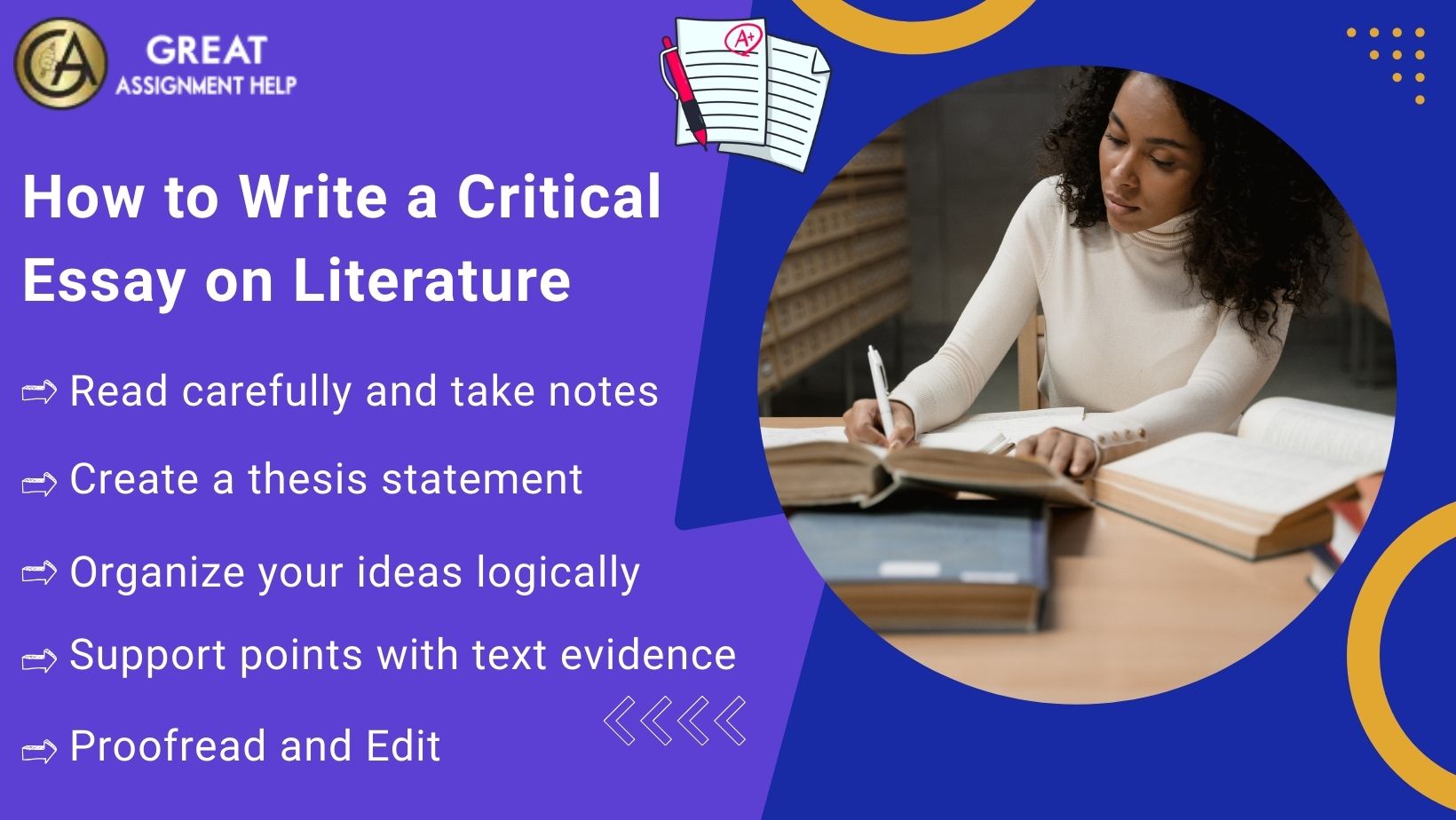Learn how to write critical essays and theoretical analyses for literature assignments to improve your analytical skills and effortlessly finish your task. If you want to write great critical essays, then first, read texts carefully and understand their context. Then, apply theoretical frameworks to analyze them. Finally, build strong arguments with evidence and organize your thoughts clearly.
Literature is more than a subject. Generally, literature will help you understand people, society, history, and big ideas through stories and language. But if you are a literature student, then as a part of your course, you will have to read classic and modern texts, look for deeper meanings, and learn to explain their ideas clearly using strong arguments. Moreover, you will be asked to write critical essays and do theoretical analysis for literature assignments. Usually, when preparing literature assignments on such topics, it might be challenging for you to understand complex literary theories, analyze texts deeply, or follow academic writing rules. In such cases, you can get literature assignment help from experts or read this blog. Mainly, to improve your comprehension, here, we have explained in detail about critical essays and theoretical analysis.
An Overview of Literature Assignments
Literature assignments are academic tasks based on stories, poems, or other written works. Most literature assignments focus on analyzing, interpreting, and writing about literary texts. Generally, doing literature assignments will help you develop critical thinking and communication skills. Also, it will help you understand different literary themes and theories. For literature assignments, your instructors will often ask you to write critical essays and do theoretical analysis.
What are Critical Essays?
A critical essay is a common type of literature assignment. In this kind of essay, you will have to read a text carefully, think about what it means, write your own opinion or argument about the text, and explain why it is important. Generally, when you write a critical essay on a literary text, instead of just retelling the story, you should explain how the text is written and what it tries to say. Remember, a strong critical essay should contain a clear thesis statement, support points with text evidence, explain the work’s context, and follow a logical structure.
How to Write a Critical Essay on Literature

Are you struggling to write a critical essay? If yes, then without any hesitation, follow these steps for writing a critical essay on literature.
Read carefully and take notes
Before you start writing your critical essay, read the literature text carefully and take notes. Especially while taking notes, mark any themes, symbols, or ideas that come up often. Also, write down your first thoughts and reactions about the literature. This will help you guide your analysis later.
Create a thesis statement
After you finish reading the literature text, develop a powerful thesis statement for your critical essay. Your thesis should explain what the author is trying to say and how they say it. Note that the thesis statement you create should be clear, specific, and allow you to argue or prove something.
Here, let us look at the example of a thesis statement
Weak Thesis Statement: “Shakespeare’s Macbeth is about ambition.”
This is a weak thesis statement because it is too simple and not detailed enough.
Strong Thesis Statement: “In Macbeth, Shakespeare shows that ambition can be dangerous by following the main character’s fall into moral confusion.”
This thesis statement gives a clear idea, and you can support it with examples from the text.
Organize your ideas logically
Once you have developed a thesis statement for the critical essay, make a plan for your argument. The outline should contain three main sections such as the introduction, body, and conclusion.
Always begin your essay with an introduction that catches your reader’s interest, gives some background about the text, and clearly states what your main point is.
Next, write the body paragraphs. Each paragraph should start with a clear idea, use examples or quotes from the text, and explain how they support your main point. But make sure everything connects back to your main argument.
Finally, finish your essay with a conclusion that sums up your ideas and explains why your argument is important.
Support points with text evidence
In your critical essay, don’t just add quotes without explaining them. Think about why the author chose certain words or images. Ask yourself how these choices help show the message or meaning of the text. Then, explain your thoughts clearly in your own words.
Proofread and Edit
A critical essay should be clear, well-organized, and easy to understand. Also, it should not have grammar mistakes. So, review your work carefully to make sure your ideas make sense and flow smoothly from one point to the next.
When writing a critical essay, you may experience difficulties in creating a powerful thesis statement or interpreting themes. In such a critical situation, you can get professional Assignment Help to effectively handle the essay writing process.
Understand Theoretical Analysis through Various Theories
Literary theory offers different ways to understand and interpret texts. Theoretical analysis means using these ideas to find deeper meanings in the work. There are several common types of literary theories that people use to study literature. They are
- Feminist Theory: It looks at how books show the roles of men and women, who has power, and how women are represented.
- Marxist Theory: It focuses on how social classes, money, and living conditions affect the story.
- Psychoanalytic Theory: It studies characters’ hidden desires, reasons for their actions, and how their childhood shapes them.
- Post-colonial Theory: It looks at how colonial rule affects people’s identity, culture, and power.
- Structuralism and Post-structuralism: It focuses on the basic rules of language and how meaning is created or broken down.
Typically, using these theories to analyze literature can be very interesting, but it can also feel confusing, especially if you are not used to complex ideas. Theoretical analysis needs careful thinking and clear explanations. You also need to know the text well and understand the theory you are using.
How to Perform Theoretical Analysis on Literature
Theoretical analysis means using a specific theory to interpret a literary text. Here are some simple steps to do it effectively
- First, pick a theory that matches the main ideas in the text. For example, you can use feminist theory to look at gender roles in The Handmaid’s Tale or Marxist theory to study class issues in The Grapes of Wrath.
- Learn the important ideas and questions of the theory before you start using it. Make sure to know about the popular thinkers like Freud, Marx, and Derrida, and the key concepts of their theories.
- Next, read the text again while thinking about the theory. Ask yourself questions about power, identity, or language.
- After that, create a main point for your analysis based on the theory. For example, you can show how a story challenges certain ideas using feminist theory.
- Next, support your ideas with examples from the text and quotes or ideas from theorists.
- Always focus on a few main themes, characters, or parts of the text instead of trying to analyze everything at once.
Wrapping Up
If you have strong knowledge of the literature concepts, then you can effortlessly prepare high-quality assignments. However, sometimes, for certain reasons, it might be challenging for you to do literature assignments, especially critical essays and theoretical analyses. At such moments, you can follow the tips suggested in this blog or take our Literature Assignment Help services. Specifically, as per your needs, the literature experts from our team will help you write critical essays and do theoretical analysis in advance of your deadline. Also, you can send us a ‘Take My Class For Me’ request if you wish to strengthen your knowledge of literary theories and writing skills.



